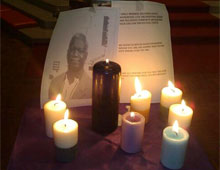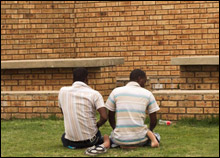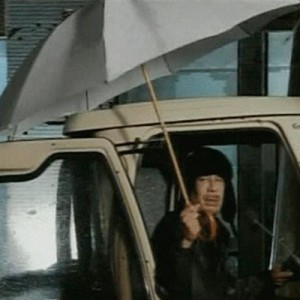
21 February 2011: Gaddafi appears on Libyan state television clutching an umbrella
Gadaffi furls and unfurls his umbrella
a giant bat’s wing
in the desert
where it never rains
but tonight
bombs hail down from the sky
shredding pale flesh to lace…
red tear drops splatter
on the desert’s face
in this frail fight for freedom
where people scream into radio silence
and hospitals try to contain their pain.
Tell the world, the crying doctor implores, (Read more…)
Wed, February 23 2011 » Creative Writing » Leave a comment
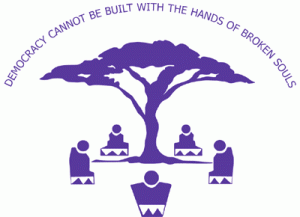 The Solidarity Peace Trust condemns the relentless harassment of Zimbabwean refugees in South Africa at a time when Zanu PF is once again terrorising Zimbabweans in some parts of their country.
The Solidarity Peace Trust condemns the relentless harassment of Zimbabwean refugees in South Africa at a time when Zanu PF is once again terrorising Zimbabweans in some parts of their country.
We draw South Africa’s attention to the fact that Movement for Democratic Change (MDC) members and supporters are once again being abducted or arrested – in some cases after being attacked by marauding gangs. In some rural areas, it is alleged that homes are being burnt down, crops destroyed and food aid withheld. Soldiers are alleged to be taking part in the harassment and threats.
South Africans need to be aware of the escalating destabilization that is preventing asylum seekers, refugees and economic migrants from going home. The majority of Zimbabwean exiles would prefer to return to their families and rebuild their lives but they continue to perceive that it is unsafe to do so. (Read more…)
Mon, February 21 2011 » Diaspora, Human rights, Press Releases, Zimbabwe Update » Leave a comment

This Cape registered cross border transporter was seen at Beitbridge with this precarious load: in July 2010, Zimbabweans were sending their worldly possessions back home as a precaution against losing everything again in xenophobic attacks.
By Professor Mike Neocosmos – Centre for Humanities Research UWC, South Africa
At the very time when it most often mouths the word, the West has never been further from being able to live a true humanism – a humanism made to the measure of the world (Aimé Césaire).
Whoever is engaged in popular struggles for democratic emancipation in Africa today is confronted with an immediate problem concerning human rights. While on the one hand a discourse of rights is seemingly necessary for thinking democratisation given that the state regularly flouts these, on the other human rights seem to refer to a discourse mainly propounded by neo-liberal interests whether local or foreign. Several repressive regimes in Africa and elsewhere (Zimbabwe, Sudan, maybe Cote D’Ivoire, Iran) oppose a discourse of nationalism to one on human rights. As an activist, one finds oneself in a seemingly irresolvable discursive contradiction between human (predominantly individual) rights and national (or group or identity) rights. At times this contradiction is central to government itself. For exampling in Thabo Mbeki’s South African government, a central contradiction appeared in the form of a commitment to neo-liberal conceptions of rights on the one hand along with a sensitivity to national and racial oppression in Africa on the other. This was reflected in government reactions to a number of different issues including Zimbabwe. In fact this contradiction is arguably constitutive of the subjectivity of the new South African bourgeoisie itself. On the one hand their private accumulation is premised on an adherence to neo-liberal precepts including human rights, on the other a sensitivity to racism and to a lesser extent to Western hegemony in African affairs is also evident. The manner in which the vagaries of this contradiction were navigated explains much regarding Mbeki’s presidency (Neocosmos, 2002). (Read more…)
Fri, February 4 2011 » Human rights, Zimbabwe Review » Leave a comment
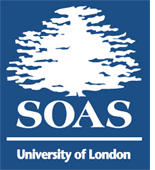 By Stephen Chan – Professor of International Relations at the School of Oriental and African Studies in the University of London. Yale University Press will release Professor Chan’s Southern Africa: Old Treacheries and New Deceits in 2011. A South African edition will be published by Jonathan Ball.
By Stephen Chan – Professor of International Relations at the School of Oriental and African Studies in the University of London. Yale University Press will release Professor Chan’s Southern Africa: Old Treacheries and New Deceits in 2011. A South African edition will be published by Jonathan Ball.
There is no single view of Zimbabwe internationally. As 2011 begins, the many views fragment or develop internal variations almost as a parallel to the fracturing of the Zimbabwean political landscape. The fissures within ZANU-PF and MDC-Mutambara, the readvent of ZAPU, the lacklustre performance of Morgan Tsvangirai as Prime Minister, and the self-seeking demeanour of elected parliamentarians on all sides, have created an international sense that there is neither predictability nor governmental capacity in the present or near-future Zimbabwe.
Africa has long had its own divided opinions about Zimbabwe and about Robert Mugabe. There is still a surly endorsement among what might be loosely called the ‘African general public’ of Mugabe’s standing up to the West, but this has always been matched by a huge disenchantment with government leadership in all countries. Mugabe may have stood up to the West, but he is as corrupt as any African President and as untrustworthy. Times have marched on in any case. The power-sharing deal brokered by Thabo Mbeki would not have been possible today – and perhaps even yesterday – in West Africa. The somewhat more robust – even if, at time of writing, rhetorical – reaction of ECOWAS to the crisis in Cote d’Ivoire, compared to that of SADC to the stolen Zimbabwean election, is the case in point. (Read more…)
Fri, January 21 2011 » Zimbabwe Review » 3 Comments
By Brian Raftopoulos – Centre for Humanities Research, University of the Western Cape, and Solidarity Peace Trust. This article has been published in ‘The Round Table‘
Introduction
At the heart of the Southern African Development Community (SADC), mediation on the Zimbabwe crisis has been the role of the South African government, which in its position as political and economic leader in Southern Africa has attempted to end the decade-long political crisis in the country. The complexity of this task must be set against the many challenges facing such a process, including the continued recalcitrance of a former liberation movement determined to defy a plebiscite rejecting its continued rule, the impediments in implementing the regional body’s protocols on democratic accountability, and the perplexing task of navigating a path between the demands of the ‘good governance’ agenda of the international community and a still resonant anti-imperialist messaging of a resurgent nationalist politics. In addition to this, then President Mbeki had to deal with strong perceptions of his own bias towards the Mugabe regime throughout the mediation, and a divided opposition in which the different formations used the mediation to deal not only with the Mugabe regime but also with their own contestations over future electoral competition and positioning over possible state power. Thus, as is often the case, such mediation became the site of intense contestation in which national, regional and international forces became embedded in an increasing complexity. (Read more…)
Wed, January 19 2011 » Global Political Agreement, Zimbabwe Review » 3 Comments




